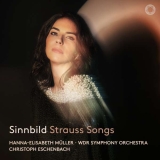Es gibt auf dieser CD ganz herausragende Momente, etwa im jugendlichen, frischen ‘Ständchen’, im ergreifend schönen ‘Morgen’ oder im wunderbar stimmungsvollen ‘Waldseligkeit’. In diesen wie auch in den anderen Orchesterliedern bilden Orchesterklang und Stimme immer eine Einheit.
Christoph Eschenbach und das WDR-Orchester zeigen beim Gestalten des Orchesterparts viel Feingefühl, um eine klangliche Schatulle für die schöne Stimme von Hanna-Elisabeth Müller zu liefern. Die Sängerin singt mit viel Einfühlungsvermögen, stilsicher, mit leuchtend-jugendlichem Timbre und einer reichen Farbenskala. Hin und wieder überrascht etwas viel Vibrato, gelegentlich gibt es auch eine nicht besonders schöne Schärfe im Gesang. Obwohl sie hundertprozentig dem Text verpflichtet singt, ist dieser Text meistens nicht verständlich.
Ohne jede Einschränkung ist das Spiel des Orchesters zu werten, dessen Wärme und Lichttransmission optimal sind. Eschenbach hält es am Zaum und legt mehr Wert auf Intimität als auf große Klangwogen.
Aufs Ganze gesehen ist dies eine schöne und mit nur 46 Minuten etwas kurze Strauss-CD, die allerdings für die Spitzenreiter Schwarzkopf, Norman, Isokoski und Janowitz keine ernstzunehmende Konkurrenz ist.
There are quite outstanding moments on this CD, for example in the youthful, fresh ‘Ständchen’, in the movingly beautiful ‘Morgen’ or in the wonderfully atmospheric ‘Waldseligkeit’. In these as in the other orchestral songs, orchestral sound and voice always form a unity.
Christoph Eschenbach and the WDR Orchestra show great sensitivity in shaping the orchestral part to provide a sonic treasure chest for the beautiful voice of Hanna-Elisabeth Müller. The singer sings with great sensitivity, stylistically confident, with a luminous, youthful timbre and a rich range of colors. Now and then a little much vibrato surprises, occasionally there is also a not particularly nice sharpness in the singing. Although she sings one hundred percent committed to the text, most of the time this text is not intelligible.
The orchestra’s performance is excellent throughout, with much warmth and transparency. Eschenbach keeps the orchestra in check, placing more emphasis on intimacy than on great surges of sound.
Taken as a whole, this is a fine and, at only 46 minutes, somewhat short Strauss CD, though it is no serious competitor for the front-runners Schwarzkopf, Norman, Isokoski and Janowitz.
























